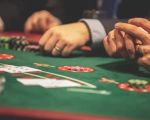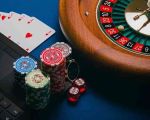Best Strategies for Playing Blackjack in Land-Based Casinos
- 1. Understanding the Basics of Blackjack
- 2. The Best Strategy for Blackjack
- 3. Card Counting and Its Effectiveness
- 4. Managing Your Bankroll in Blackjack
- 5. Psychological Tips for Blackjack Players
- 6. Real-Life Case Studies of Successful Blackjack Players
1. Understanding the Basics of Blackjack
Before diving into advanced strategies, it’s important to understand the fundamentals of blackjack. The game is simple: the goal is to have a hand value of 21 or less, but higher than the dealer's hand. Face cards (Jack, Queen, King) are worth 10, aces can be 1 or 11, and the rest of the cards are valued at their face value.
Blackjack is played with one or more decks of cards, and the dealer will give two cards to each player and themselves, with one card face-up and the other face-down. Players then decide whether to "hit" (get another card) or "stand" (keep their current hand). The dealer must follow specific rules based on the cards they have, such as hitting until they reach at least 17.
The beauty of blackjack lies in its simplicity, but don’t let that fool you—there’s a lot of strategy involved in making the best decisions to maximize your chances of winning. As someone who has spent quite a bit of time at land-based casinos, I can tell you that understanding the basics and refining your strategy is key to enjoying the game and improving your odds.
2. The Best Strategy for Blackjack
The best strategy for blackjack focuses on making mathematically sound decisions to reduce the house edge. One of the most effective ways to do this is by using basic strategy, a set of rules that tell you the optimal action to take based on your hand and the dealer’s upcard. The idea is to minimize the house advantage, which is typically around 0.5% when using the correct strategy.
Basic strategy involves knowing when to hit, stand, split, or double down. For instance, if you have a hand of 12 and the dealer shows a 4, basic strategy suggests that you should stand because the dealer is likely to bust. On the other hand, if you have a hand of 16 and the dealer shows a 10, basic strategy advises hitting, as you’re more likely to lose if you stand.
Over time, I’ve found that using basic strategy consistently leads to better results. While it doesn’t guarantee a win every time, it significantly improves your chances compared to simply guessing what to do next. Many casinos even offer basic strategy charts, so it’s easy to learn the proper approach and apply it during your game.
3. Card Counting and Its Effectiveness
Card counting is one of the most talked-about strategies in blackjack, and for good reason—it can give players an edge over the house. The concept behind card counting is simple: keep track of which high and low cards have been dealt. High cards (10s, face cards, and aces) are advantageous to the player, while low cards (2s, 3s, 4s, 5s, and 6s) favor the dealer.
When you have a "positive count," meaning more high cards are left in the deck, the player has a greater chance of winning. By increasing your bet size when the count is high and decreasing it when the count is low, you can take advantage of favorable situations. However, card counting requires intense concentration and a good memory, which is why it's not a foolproof strategy for everyone.
In my experience, card counting can be highly effective when done correctly, but it’s not for the faint of heart. Many casinos are aware of this strategy and will ask players to leave if they suspect card counting. To make it work, you need to be subtle and practice frequently. If you’re serious about counting cards, there are many resources available to help you hone your skills.
4. Managing Your Bankroll in Blackjack
One of the most important aspects of playing blackjack is managing your bankroll. Without proper bankroll management, even the best strategies can lead to losses. When you sit down at a blackjack table, it’s essential to set a budget for yourself and stick to it. This means deciding ahead of time how much you’re willing to risk and when to walk away.
It’s also important to decide on your bet size based on your bankroll. For example, if you have a $1,000 bankroll, you might want to set your bet size at 1-2% of your total bankroll per hand. This approach ensures that you can weather the ups and downs of the game without risking too much too quickly. Personally, I find that sticking to a betting range based on my bankroll helps me stay disciplined and avoid impulsive decisions during a game.
4.1. Setting Win and Loss Limits
In addition to setting a betting range, I’ve also found it useful to set win and loss limits. For example, if I reach a certain profit or loss amount, I’ll call it a day. This prevents me from chasing losses or getting too greedy when I’m on a winning streak. Setting these limits is a simple but effective way to protect your bankroll and ensure that you don’t get carried away in the heat of the moment.
5. Psychological Tips for Blackjack Players
Blackjack is as much a mental game as it is a strategic one. Understanding how to manage your emotions and maintain focus during the game is essential to long-term success. One of the biggest challenges blackjack players face is staying calm when things aren’t going their way. When you're on a losing streak, it’s easy to get frustrated or anxious, but making rash decisions will only worsen the situation.
5.1. Stay Calm and Focused
In my experience, staying calm and focused is key to making smart decisions. If you start feeling anxious or frustrated, take a break and step away from the table. Giving yourself a moment to relax and clear your mind can help you regain your composure and approach the game with a fresh perspective.
5.2. Don’t Chase Losses
Another psychological tip is to avoid chasing losses. When you’re behind, it’s tempting to increase your bets to recover lost money, but this often leads to bigger losses. Stick to your strategy, and remember that blackjack is a game of probabilities. Sometimes, it’s better to walk away and try again another day rather than trying to force a win.
6. Real-Life Case Studies of Successful Blackjack Players
Over the years, there have been many famous blackjack players who have used strategies like card counting to win big in land-based casinos. One of the most well-known examples is the "MIT Blackjack Team," a group of students and graduates from MIT who used card counting to win millions of dollars at casinos worldwide. Their success was based on a combination of skill, discipline, and teamwork.
Another inspiring story is that of Don Johnson, who famously won over $15 million from casinos in Atlantic City in 2011 using a combination of card counting, negotiation, and favorable rules. Johnson’s success shows that with the right strategies and the ability to stay disciplined, it’s possible to make significant profits in blackjack. His story is a testament to the power of strategy and careful bankroll management in the world of land-based casinos.
If you’re looking to improve your blackjack game, I highly recommend visiting CasinoScope for expert advice and the latest tips on strategies that can help you succeed in land-based casinos. Whether you're a beginner or a seasoned player, learning from the best can make all the difference in your gaming experience.








